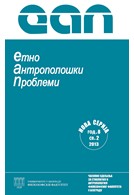Transition économique et usage de la tradition: Les contextes illusoires du principe de la réciprocité dans les rites de passage en Serbie rurale
Economic Transformation and the Utilization of Tradition: Achieving Covert Benefits through the use of Reciprocity in Rites of Passage in Serbian Villages
Author(s): Slobodan NaumovićSubject(s): Customs / Folklore, Cultural Anthropology / Ethnology, Sociology of Culture, Socio-Economic Research
Published by: Филозофски факултет, Универзитет у Београду
Keywords: utilizing tradition; rites of passage; the wedding ritual; generalized, symmetrical and negative reciprocity; euphemization; symbolic violence;
Summary/Abstract: The paper, which is part of a larger whole, offers an attempt to interpret new forms of behavior, especially the complex interplay between different forms of gift giving and consumption in contemporary marital rites. These forms of behavior, which tend to mimic traditional patterns, but are far from them, represent the symbolic responses of peasants to the economic pressures of the outside environment. The concept of the use of tradition is offered as a framework through which it is possible to link the entirety of socio-economic conditions with deliberate actions by individuals or groups in a rural environment. Playing with the multiple meanings which can be ascribed to the forms of behavior that mimic traditional patterns, especially the reciprocity of different forms of exchange of gifts and wedding feasts, enables the transformation of interests which it isn’t advisable to endorse into actions which are acceptable to everyone. To use Bourdieu’s terms, consciously resorting to traditional forms of behavior enables the "euphemization" of their original meaning and the real reasons behind their use, and constitutes the first step in the use of tradition. The second step in this process is linked to choice between different behavioral patterns (the flows of reciprocity on the one hand, and conspicuous, prestigious consumption on the other) and playing with the social consequences of such choices. The possibility of using elements of the traditional cultural pattern of the wedding in order to maintain or elevate one’s social status was present before, especially due to the multifaceted practice of gift giving, or rather, the possibility of giving a gift which is larger than the expected return gift. The only difference between the traditional and the contemporary model of wedding practices is that today it’s possible to elevate one’s status through consumption which completely sidesteps the established channels of reciprocity and mutuality. Namely, while the former patterns of behavior made it possible to elevate one’s status only to the extent to which other members of the community received gifts, or the extent to which other members of the community profited from "excessive" gift giving, today it is necessary to build one’s social standing through consumption which completely sidesteps the channels of mutuality (like spending money on ordering songs, on orchestras, large tents, limos etc.) In a system like that, the practice of utilizing tradition, the public focus on gift giving and other forms of mutual exchange, serves primarily (but not only) to diminish the intrusiveness of new forms of behavior, especially "pure status consumption", and to make their social consequences more acceptable.
Journal: Етноантрополошки проблеми
- Issue Year: 8/2013
- Issue No: 2
- Page Range: 343-383
- Page Count: 41
- Language: French

